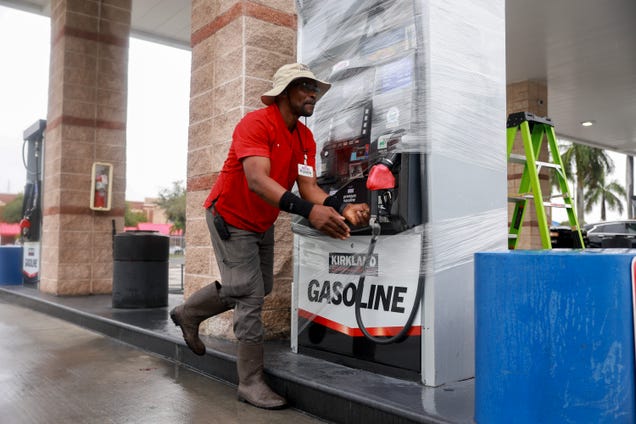The Impact of Hurricane Milton on Florida’s Fuel Supply
As Hurricane Milton approaches the west coast of Florida, the state is bracing for significant disruptions. With the storm classified as a Category 4, residents are already feeling its effects, particularly regarding fuel availability. Reports indicate that nearly 25% of gas stations in Florida are out of fuel, raising concerns about transportation, emergency services, and overall public safety. Understanding the implications of this situation is crucial for both residents and authorities.
Understanding the Fuel Crisis Amidst a Natural Disaster
The immediate concern for many Floridians is the availability of gasoline. As the storm looms, panic buying has led to long lines at gas stations, with many quickly running out of fuel. This phenomenon is not uncommon during hurricane season, as residents prepare for potential evacuations and stock up on supplies. According to the American Automobile Association (AAA), fuel demand often spikes in anticipation of storms, leading to shortages that can exacerbate the challenges faced by communities.
The current situation highlights the importance of effective communication and preparedness. Local governments and fuel suppliers must work together to ensure that information about fuel availability is disseminated promptly. Moreover, establishing a clear plan for fuel distribution during emergencies can help mitigate the chaos that often accompanies natural disasters.
The Role of Emergency Services in Fuel Management
Emergency services play a vital role in managing fuel resources during hurricanes. First responders rely heavily on gasoline to operate vehicles and equipment, making it essential for them to have access to fuel even when supplies are low. In Florida, agencies like the Florida Division of Emergency Management are tasked with coordinating fuel logistics during disasters. This includes identifying critical infrastructure that requires fuel and ensuring that these facilities are prioritized.
Additionally, the state has been known to implement fuel rationing during severe weather events to manage shortages effectively. By limiting the amount of fuel each vehicle can purchase, authorities can extend the available supply and ensure that essential services remain operational.
Lessons from Previous Hurricanes
Looking back at past hurricanes can provide valuable insights into managing fuel shortages. For instance, during Hurricane Irma in 2017, Florida experienced widespread fuel shortages that left many residents stranded. The state learned from this experience, implementing measures such as improved communication strategies and better coordination with fuel suppliers.
Case studies from other states also offer lessons. After Hurricane Sandy struck the Northeast in 2012, New Jersey faced significant fuel shortages. The state responded by establishing a fuel distribution network that prioritized emergency services and essential workers. This proactive approach helped alleviate some of the pressure on gas stations and ensured that critical services could continue operating.
Preparing for Future Storms
As Hurricane Milton approaches, it serves as a reminder of the need for ongoing preparedness efforts. Residents should be encouraged to develop personal emergency plans that include fuel considerations. This might involve keeping a full tank of gas during hurricane season or identifying alternative transportation options in case of fuel shortages.
Moreover, local governments can enhance their emergency preparedness by conducting regular drills that simulate fuel distribution during disasters. These exercises can help identify potential bottlenecks and improve response times when real emergencies occur.
The Importance of Community Resilience
Ultimately, the situation surrounding Hurricane Milton underscores the importance of community resilience in the face of natural disasters. By fostering a culture of preparedness and collaboration, residents and local authorities can better navigate the challenges posed by hurricanes and other emergencies.
In conclusion, as Florida faces the impending impact of Hurricane Milton, the fuel crisis serves as a critical reminder of the interconnectedness of emergency preparedness, community resilience, and effective communication. By learning from past experiences and implementing proactive strategies, the state can better equip itself to handle future storms and minimize the disruptions that accompany them.

